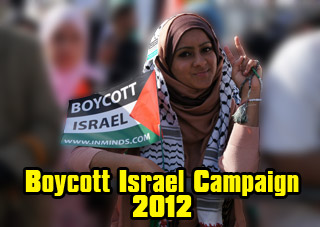
 Innovative Minds © 2014. All Rights Reserved. www.inminds.co.uk | |||||||||||
|
Comment: Activists in the struggle against apartheid Israel can learn so much from the resolve of those who struggled against apartheid in South Africa.
Drops in ocean that turned tideMary Dundon, Irish Examiner 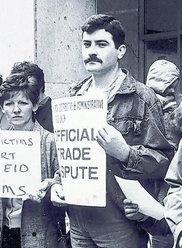 Anti-Apartheid strike outside Dunnes Stores, Dublin When Vonnie Munroe walked off her job in protest at the Dunnes Stores selling South African goods 20 years ago today, she did not realise that it would cost her her home.The 27-year-old mother also knew very little about South Africa, except that it had a very repressive apartheid system that excluded blacks from almost everything. But Vonnie was a member of a fairly strong union, IDATU, which had just issued a directive to all its members not to handle South African goods. Her co-worker, Mary Manning, was the first Dunnes Stores worker to be tested on the union directive at the check-out when a woman came up to her with two South African Outspan grapefruit in July 19, 1984. Mary prayed the woman would bypass her. But when she opted for Maryâs check-out, the 21-year-old told the customer she could not handle the South African goods because her union was opposed to the importation of goods produced under the apartheid regime. Mary was immediately suspended and 10 more of her co-workers - including one man - clocked out in support with her at Dunnes Stores Henry Street branch in Dublin. Vonnie, who worked in the storeâs office, clocked out because she believed that blacks were being badly treated in South Africa. âWe did not know a lot about apartheid at the start, but as the strike grew we learnt more and we just wanted to let Irish people know what was really going on,â Vonnie said. Like her fellow strikers, Vonnie did not think the strike would last long and that they would be back at work within a couple of weeks. But they did not bargain on the resolve of Ben Dunne, who told the workers he admired their guts but wasnât going to budge an inch. 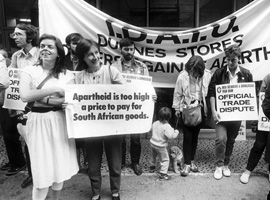 11 strikers that shook apartheid It took two years and nine months to break the deadlock in one of the most bitter strikes the country ever witnessed. And the deadlock was only broken after the Government caved in and banned the importation of South African goods here. But the Stateâs intervention came too late for Vonnie, who was forced to give up her home because she could not afford the repayments on £21 strike pay a week. âIt was huge price to pay - especially since I had a three-year-old daughter to support - but my family were very good and supported us in every way through out the strike.â Vonnieâs mother was not as supportive of her stance in favour of the South African blacks and thought she was mad to give up her home. But Vonnie did not think so. âEven though I was forced to take a one-bedroomed flat, we were still better off than the terrible conditions that the blacks were living in in South Africa just because of the colour of their skin,â Vonnie said. Both she and Mary Manning were supported by eight other striking women and one man in the Henry Street Dunnes Stores branch. Another worker from the Crumlin branch of Dunnes Stores also went on strike. Like Vonnie Munroe, the other strikers all agree now that they knew very little about South Africa or apartheid when they first refused to handle the goods from that country. Mary Manning said they were just following union instructions. âNone of us were very political and there was a huge personal sacrifice, because my wages dropped from over £100-a-week to £21 - but I was lucky to be living at home and have a very supportive family.â The Dunnes Storesâ strikers attracted the attention of the world media for their stance, but the lack of support from the Irish public, their fellow workers, the wider trade union movement and the Church, did not help the strikersâ morale in the early days. Mary Manning said a lot of the public were very ignorant. âOne woman came up to me and said I was right not to handle South African goods because she would not either if black people had handled it before her.â Vonnie Reynolds said many of the public spat at them and shouted abuse, calling them ânigger loversâ and telling them to âlook after their ownâ instead. The number of clergy ignoring the picket prompted the strikers to ask the Catholic Church for support because apartheid was immoral. But it was not until Bishop Eamon Casey publicly supported them and the Conference of Religious Superiors also issued a statement of support, that a lot of clergy stopped going in to Dunnes Stores. It took the Irish Congress of Trade Unions a year to issue a statement of support. In the meantime two of the strikers had a visit from the Special branch who told them they were âsilly little girlsâ who did not realise they were small cogs in a big wheel. In 1985, Karen Guerin and Mary Manning went to London to meet Bishop Desmond Tutu when he was on his way to Stockholm to collect the Nobel Prize for peace. âBishop Tutu was very supportive and invited us to South Africa - but when we tried to visit there we were held at gunpoint for eight hours at Jan Smuts airport and put on a plane to Heathrow,â Karen added. This still did not deter the strikers, many of whom were now becoming more political. Karen and Michelle Gavin went on to address the UN Special Committee on Apartheid after being thrown out of South Africa. The Irish Government eventually caved in on January 1987 and imposed a ban on the importation of all South African goods. The strikers believe they were directly responsible for this change. âWe were very young and very idealistic and hoping to change the world - we did make a significant contribution to changing the Government policy on South African goods,â Karen Guerin said. The strike officially ended in April 1987. All the strikers were members of the former IDATU union. Their union branch official at the time, Brendan Archibold said the strike showed how workers in richer parts of the world could help those living in oppressed regions if they were prepared to take a stance. Source: http://archives.tcm.ie/irishexaminer/2004/07/19/story105709481.asp Plaque unveiled to honour Dunnes actionPaul Cullen, Irish Times 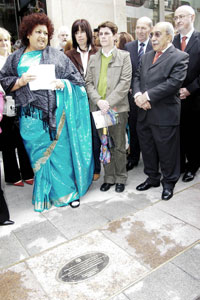 South African Ambassador Priscilla Jana attended the unveiling of the plaque to honour the Dunnes Stores strikers One of Ireland's most bitter, long-running and unusual strikes has also become one of the first to be marked with a commemorative plaque. Dublin's deputy lord mayor Anne Carter yesterday unveiled the plaque, which honours the 11 Dunnes Stores workers who staged a 2½-year anti-apartheid strike in the 1980s. The dispute fundamentally altered Ireland's attitude to the regime then in power in South Africa and was regarded as an inspiration to anti-apartheid movements internationally. Among the first to welcome the commemoration of the strike with a plaque embedded in front of Dunnes's store on Henry Street was former South African president Nelson Mandela. "Young workers who refused to handle the fruits of apartheid 21 years ago in Dublin provided inspiration to millions of South Africans that ordinary people far away from the crucible of apartheid cared for our freedom," Mr Mandela recalled, in remarks relayed through Kader Asmal, the chairman of the Irish Anti-Apartheid Movement at the time of the strike. The event also drew an admission by Labour TD Ruairí Quinn, who, as minister for labour, introduced the ban on South African fruit and vegetables that brought the strike to a successful conclusion. He revealed that the Fine Gael-Labour cabinet was split on the issue and the sanctions were agreed only on the casting vote of taoiseach Garret FitzGerald. It would not have been possible to introduce the sanctions but for the tenacity of the strikers and their supporters, he said. Contacted yesterday, Dr Fitzgerald said he couldn't recall the vote but that he had supported the ban. Inscription on plaque âAs a tribute to the Irish people and, in honour of their courage, spirit and unyielding commitment towards freedom in South Africa, the President of the Republic of South Africa Thabo Mbeki, dedicated a plaque to Mary Manning, the twenty one year old Irish woman, who courageously took a stand against Apartheid in 1984. The plaque was presented to Mary Manning and her colleagues from Dunnes Stores by the South African Embassy this year to celebrate the 100th Anniversary of International Womanâs DayâDunnes representatives were invited to the event yesterday but organisers said they declined to attend. South Africa's ambassador to Ireland, Priscilla Jana, told a breakfast in City Hall later that the strike was "one of the longest, most bitter and one of the most profound acts of solidarity" of the struggle against apartheid. "These brave men and women were in the prime of their youth then. No ego, no glory, no personal gains, just a dogged determination to fight against what they believed was unjust, unfair and inhuman." She paid individual tribute to the 11 original strikers and a 12th who joined later - Mary Manning, Catherine O'Reilly, Karen Gearon, Theresa Mooney, Vonnie Munroe, Sandra Griffin, Alma Russell, Michelle Gavin, Liz Deasy, Dorothy Dooley, Tommy Davis and Brendan Barron. Prof Asmal, a former minister in post-apartheid South Africa, said the strikers' actions evoked admiration from all sectors of Irish and international opinion. While there had been strikes against apartheid in Sweden and Australia, these were of short duration while the Irish strike was an indefinite one. Brendan Archbold of the shopworkers' union Idatu (now Mandate) said the Dunnes workers had gone on an official strike by bravely and staunchly following union policy. Union members had a duty to stand by their colleagues in the developing world, but didn't always deliver on this. All the strikers are still living in Ireland and most attended yesterday's event. Some returned to work in Dunnes after the dispute ended but didn't stay for long and have moved on to other jobs or are now raising families. "It's a long time ago now but it changed us all," recalled Sandra Griffin. She said the low point in the dispute was watching other Dunnes workers waving their Christmas bonuses in her face when she was on the picket line; the high point was meeting Mr Mandela when he came to Dublin in 1990 after his release from prison. Source: http://www.irishtimes.com/newspaper/ireland/2008/0619/1213810561161.html The two oranges that shook ApartheidJoanne Corcoran, An Phoblacht Twenty years ago this month, ten workers from the Henry Street branch of Dunnes Stores in Dublin's city centre went on strike to protest the selling of produce from Apartheid South Africa. A year later, the group was joined by another worker, Brendan Barron, from the Crumlin store, bringing their number to eleven. The workers had no idea when the strike started that it would last for almost three years, or that it would ultimately result in the government banning South African goods from Irish stores. Last Monday, the strikers, family members and supporters, met in Dublin for an anniversary re-union. On the night, An Phoblacht's JOANNE CORCORAN talked to Karen Gearon, the then shop steward, about her memories of the strike. 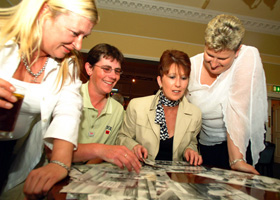 Catherine O'Reilly, Karen Gearon, Alma Bonnie and Mary Manning pore through some of An Phoblacht's file photos from the famous dispute When Karen Gearon walked out of Henry Street Dunnes Stores 20 years ago, she had no idea how significant the strike she was about to embark on would become. "Basically, it started when our union passed a resolution at their Easter conference saying that members should not handle South African goods because of Apartheid," Karen recalls. "That was at Easter and we got the instruction down in July, about two days before the actual strike started. I was the shop steward at the time, so I passed it round to everybody. "At the time we were going through a lot of hassle with Dunnes. They treated us very badly as employees, so we were really at our wits' end. Then this instruction came, and at the time it could have been about anything. It could have been about not selling milk in a carton and we would have followed it. "We were so naïve we actually didn't know what goods in the shop were South African," she laughs. "We had to go around picking things off shelves and checking. We found out it was mainly fruit and vegetables that carried the South African logo." According to Karen, management reacted immediately to the buzz of protest on the shop floor. "They started bringing us up to the office and intimidating us, saying 'you know, if you continue to do this you're going to lose your job, you're going to be sacked'." On Thursday 19 July 1984, the staff's resolve was put to the test. A customer approached Mary Manning, who was on the checkout at the time, with two South African Outspan oranges. Mary gritted her teeth and politely told the customer she couldn't handle the goods because they were South African. "Mary was brought upstairs with myself and was given five minutes to reconsider her position," Karen says. "We weren't allowed talk to each other during the five minutes. She was kept in one room and I was kept in the other. And then we came back in and Mary said, 'No, I'm sticking by my position', and the Dunnes Stores strike began." Karen called the union and told staff what had happened. "More people walked out that day than actually stayed on strike," she says. "A couple of them went back two days later. "We decided we wanted to learn more about the issue, and so we started to look into South Africa and what was happening there," Karen remembers. "The more we learned, the more passionate we felt. "There were so many people who made such a big impression on us. Nimrod Sejake, who was a black South African exile, joined us practically every single day, and he was amazing. Karen says one moment stands out in her mind, that to her, made it all worth it. "A man called Marius Scoone, who was a white South African, came to give us his support," she says. "His wife and daughter had been killed by the security forces in South Africa and he got up on the podium and praised us for what we were doing. That had a real effect on me." Tutu and a trip to South AfricaThe strike began to gain serious momentum when Archbishop Desmond Tutu invited some of the group to meet him in London while he was en route to collect the Nobel Peace Prize. Karen, Mary Manning, IDATU union official Brendan Archbold and the meeting's organiser, Don Mullen, travelled over. "That was definitely the turning point," says Karen. "We got massive publicity and he invited us over to South Africa." A plan was made to travel to South Africa on the first anniversary of the start of the strike. "We had no money to carry out our plan, so we had to do a collection," Karen says. "One Friday night we went out around Dublin and raised £6,000. That showed us just how much support was out there, because the '80s wouldn't have been an affluent time in Ireland. Anyhow, we booked the trip and were ready to go." But when the group checked in at Heathrow Airport that July, they were summoned to the information desk and told they couldn't get on the flight. "The South African authorities had told Heathrow that they would not allow the plane to land in South Africa if we were on it," says Karen. "We didn't know what the hell was going on. We were asked to submit our boarding passes and we refused to do it. They even took our luggage off the plane. But we held on to our boarding passes. "Then somebody from the South African Embassy came to talk to us, but we refused to meet them, because we didn't recognise their authority. They wanted us to fill in visa application forms and we refused to do that too, because Irish citizens didn't require a visa to get into South Africa." The flight, which should have taken off at 7pm, was by this stage running three hours late. "We genuinely didn't think it was going to happen," Karen says. "By this point we'd all rung home and told everybody we weren't going." But five minutes after 10pm, the group was rushed onto the plane. Karen remembers the trip being a nightmare, because the captain told the impatient passengers that the people boarding were the ones who'd held the plane up for three hours. "You can imagine the atmosphere," she recalls. When the plane landed in Jan Smuts Airport in Johannesburg, it was greeted by police and army officials. "We thought it was normal. We didn't know what to expect. But then we found out that they were there for us. We got our passports checked and then we were literally surrounded by the army. We were asked if we were the group from Ireland and we said yes, and then we were escorted upstairs. We stayed there for eight hours and were sent home on the same plane." The group was terrified, but, as Karen points out, the incident turned in their favour. "Well, had they let us in, we wouldn't have got a quarter of the publicity we eventually got," she laughs. "When we arrived back in Heathrow, everybody was told to stay in their seats and the police boarded the plane. We thought, 'Oh shit, we're going to get thrown out of here as well'. But they were there to bring us to a press conference. BBC, RTÉ, the works, were all there." Shortly afterwards, Karen and Michelle Gavin were invited over to New York to address the UN Special Committee against Apartheid. "I met the Reverend Jesse Jackson, and famous musicians, activists like singer Pat Benatar and guitarist Steve Van Zandt. That was gobsmacking stuff. You have to remember I was only 21 years old." Hardship and solidarityThe strike had moments like these, but Karen remembers the hardship endured all to well. "We were on the picket line every day of every week. One winter it was so bad that we actually had plastic inside our shoes. One of the women (Vonnie Monroe) lost her house because she couldn't make the repayments on it. We had £21 union pay a week and most of us had been on £100 before that. Luckily, most of us lived at home, which made it easier. We did a lot of collections, many of them with the miners in Britain, who were also on strike at the time. There was a lot of solidarity between us." No matter how tough it was, Karen says at no stage did anybody consider giving up. During this difficult period, the picketers got a boost from the many people who supported them. "A lot of our supporters would go into the store and fill their trolleys and when everything was rung up at the cash desk, they'd walk out," Karen says. "They'd keep the South African fruit until last and then say, 'I support the boycott', and leave the trolley there." They also engaged in overnight occupations of the store, a move the group used twice. "We wanted to make a stand and say, no you're not going to leave us outside the door." Karen remembers some people coming up to the picket line and saying 'Well done'. But the people walking into the store would be embarrassed and often very hostile. "We did get the odd comment, people coming to us and saying 'Fair play to yis girls, I wouldn't handle them either, not after a black man handled them'. There were a lot of ignorant remarks like that." Karen says that because the dispute was centred around the Henry Street store, people tend to forget that other companies, like Clerys and Roches Stores, were actually implementing the boycott. "All of their staff refused to handle goods that were South African, but their companies did nothing about it," she says. "That's what made it different. It was Dunnes Stores that initiated our strike; we didn't start it." Towards the end of 1986, the union, IDATU, decided to lift the picket as a goodwill gesture to the government, who were investigating the possibility of banning South African goods. "We had a huge fall out with the union and we were trapped in a situation where they had the money," says Karen. "All of that was happening and we were very disillusioned that Christmas. Eventually, the picket line was lifted and it stayed lifted." However, the strike didn't officially end until April 1987. Some of the strikers went back to their jobs. "It was horrific, absolutely horrific," Karen says. "The bad feeling was so just so intense in there. Our colleagues had stayed on the job when we left. Some were good friends. They took a very bad view of us. Early in the strike, their canteen was just over our picket line and they would throw tea and tomatoes on top of us. It was very bitter. Aftermath"On a personal note, I should never have gone back. About 13 months later, I was offered a management position and so was Mary. But Mary was emigrating, so that was fine. She wasn't a threat. I wasn't going anywhere, so they started trying to build a case against me. And they eventually sacked me." Karen won her unfair dismissal case, but says "it wasn't worth the paper it was written on. "I was blacklisted, I couldn't get a job anywhere because I was considered a troublemaker." She was forced to move to Kerry, where she still lives, to look for work. But she believes it was all worth it. "We won," she says. "All we wanted was for us not to have to handle the goods; the bonus was the government coming out and banning them. We didn't start the movement, the movement was there before us, but we certainly brought a new life to it, and we raised its profile. "Before that strike there were about six divisions of the Anti-Apartheid Movement in Ireland," Karen says, and you can sense how proud she is. "By the time we finished there was an anti-apartheid division in every single county and some had three or four. That was an amazing achievement." Source: http://www.anphoblacht.com/news/detail/5746 Memories of a union officialAn Phoblacht 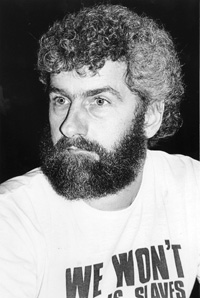 Brendan Archbold - union official Dunnes Store Strike Brendan Archbold was the IDATU union official in charge of the Dunnes Store Strike in 1984 (the strike actually started when IDATU was called the IUDWC). Still an official with the same union, now called MANDATE, Brendan spoke to us about his memories of the strike. An Phoblacht: What impact do you think the strike had? Brendan Archbold: The impact was the symbolic effect it had. In terms of the pure financial effect, I don't think we set any alarm bells ringing in Pretoria (capital of South Africa). Ireland wouldn't have been their most important market by any stretch of the imagination. But symbolically, it had a great impact. It was well organised and received publicity from around the world. It was a real stand against Apartheid and sent a shiver through the South African administration. Is there much difference between being a union official now and being one then? Some things are the same. Dunnes was a crap employer 20 years before the strike, they were crap employers during the strike and they're still crap employers. They've had three generations of anti-union management. In terms of what's changed, I suppose you could say today's society is much more consumer obsessed than it was. It's that new philosophy, 'I spend, therefore I am'. I don't know how the public would react to a strike like that now. What was the most significant thing about the strike? I suppose the fact that the group were prepared to go out in solidarity for people they'd never even met, in a time of unemployment and hardship. They have to be admired for that. Is the boycott tool still effective and are there any goods you believe should be boycotted now? I think there are a lot of candidates for boycotting at the moment, particularly Israeli goods. And there are a lot of other things we should be doing in solidarity with the developing world, not necessarily by boycotting, but even through supporting the Fair Trade Movement. But I think the boycott is not used as effectively as it could be. The trade unions need to work out a clear plan. Source: http://www.anphoblacht.com/news/detail/5747 Related ArticlesAlso Of InterestPage URL: http://www.inminds.com/article.php?id=10283
|
|
Support Us
If you agree with our work then please support us.Campaigns INMINDS Facebook Live Feed Latest Video's
INMINDS Twitter Feed Tweets by @InmindsComFeatured Video's
You need Flash player 8+ and JavaScript enabled to view this video.
[all videos (over 200)..] Featured MP3 Podcast 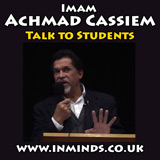 "[In Islam] for every right that you have, you also have an obligation. You have a right to education, but once you are educated you are under an obligation to educate others whether you get payed or not. You have a right to self-defense, once you are capable of defending yourself, then you must defend the defenseless.. and I'm thinking of our brothers and sisters all over the world, especially occupied Palestine.." Veteran of the armed struggle against apartheid in South Africa Talk to students, Islamic School London 2007 [43min / 17Mb] [all podcasts..] Newsletter Feedback |
 |
 |




























